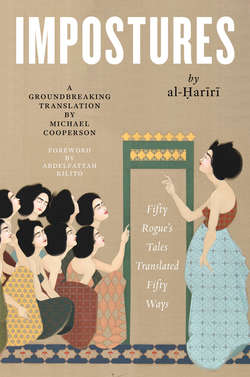Читать книгу Impostures - al-Ḥarīrī - Страница 23
На сайте Литреса книга снята с продажи.
Notes
ОглавлениеIn the original, Abū Zayd impresses his audience by increasing the number of similes and metaphors. Because “teeth as pearls” and the like were commonplace images, he is able to pack many of them into a few lines without losing the thread. In English, however, anything resembling a close translation becomes unreadably dense. Readers who wish to see for themselves may look at Chenery’s crib (Assemblies, 115–16) and Preston’s versified rendering (Makamat, 396–405). Rather than try to improve on these versions, which are freely available, this translation takes one theme—the teeth and the pearls—and sticks with it. Because this theme appears in English poetry as well, it was possible to quote entire poems without changing them. Since one of the themes of the story is plagiarism, and since Abū Zayd, a notorious liar, assures his audience that the poems are his own work, it did not seem entirely unfair to make him a plagiarist.
“Hulwán” (§2.2) is Ḥulwān, an ancient town located where the Iranian town of Sar-i Pol Zahab is today, at the entrance to one of the passes through the Zagros mountains (Lockhart, “Ḥulwān”). It was known for its olives, date palms, and sugarcane (Sharīshī, Sharḥ, 1:78). “Abuzeid of Serugium” is from Chappelow, Six Assemblies, 19.
“Bishop” (§2.3) is “a cant word for a mixture of wine, oranges, and sugar” (Johnson, Dictionary), and one of Johnson’s favorite drinks (see Boswell, Life, 1791 ed., I:135). The Arabic has “mixed him a cup,” using a rare word for “mix.” The expressions of affection between men described in this passage, and again in many other Impostures, are part of what Shawkat M. Toorawa, following Eve Sedgwick, has called the “homosocial” character of the pre-modern Arabic scholarly milieu. This is to be distinguished from the homoerotic, which appears as well (see Imposture 10).
Al-Ḥārith’s native place (§2.4) is Basra, which, being al-Ḥarīrī’s home too, is more fully realized than any other place mentioned in the Impostures (see 48 and 50). “El-Bohtoree” (§2.4) is al-Buḥturī (d. 284/897), an Abbasid court poet and leading representative of the so-called Modern school, famous for its complex images. The verses cited here compare teeth to pearls, hailstones, and daffodils. “If Rubies . . .”: Spenser, Sonnet XV in Works, p. 123, with “her” changed to “his” to match the Arabic. Preston, Makamat, 399, quotes part of this poem as well.
The Arabic verses in §2.5 add a comparison to hearts of palm and bubbles. To match it I have used “Rubies, Cherries, and Roses . . .” from The Countesse of Pembrokes Arcadia, Lib. 2., in Sidney, Complete Works, I:209. In the citations of sixteenth-century poetry I have modernized a few of the spellings to make for easier reading.
The Qurʾanic verse in §2.6 is from Ḥujurāt 49:12, here given in the 1734 translation by George Sale (1877 edition, p. 419).
The Arabic poem in §2.7 replaces the teeth with tears, which it compares both to pearls and to rain, besides adding henna-dyed fingers to the line. For this I have used “Oh teares . . .”: Sidney, Sonnet C, in Complete Works, I:282. Abū Zayd’s next lines compare the face to the moon and tears to pearls dropped from a perfumed ring. My equivalent is “Alas I found . . .”: Sidney, Sonnet LXXXVII, in Works, I:277. “The proof of the Pudding . . .”: This is the form attested in the OED citations for 1790 and 1802.
Abū Zayd’s topper (§2.8) describes parting from a veiled lover who is weeping and biting her hands in grief, which he describes as “biting crystal with pearls.” My English (“I sighed her sighs . . .”) continues Sidney, Sonnet LXXXVII, in Works, II:277.
Section §2.9 is the first recognition scene in the Impostures: that is, the first of the many scenes in which al-Ḥārith recognizes the eloquent stranger as his old friend Abū Zayd. Abdelfattah Kilito has argued that the recognition scene is what defines an Imposture (Séances, 122). For a typology of recognition scenes see Zakharia, Abū Zayd, 189–212; and for a thematic study, Kennedy, Recognition, esp. 246–306. Abū Zayd’s envoi is cobbled together from lines by Johnson, all of them from “The Vanity of Human Wishes,” except “Fate! snatch away . . . ,” which is adapted from “Stella in Mourning.”
